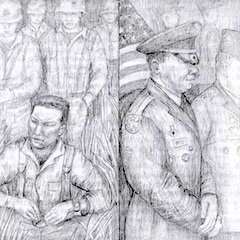|
J. William T. "Bill" Youngs, American Realities, Volume Two:
Historical Episodes from Reconstruction to the Present, Chapter Fifteen |
"Colin Powell" courtesy of the Associated Press
|
15. America, the Cold War, and Beyond
|
SummaryThe story of Colin Powell provides a window on several important threads in recent American history. As an officer in the United State army, both in the field and in Washington, Powell witnessed crucial episodes in American military history including events in Vietnam, Korea, Germany, Panama, and Iraq. Through his career we see the transformation of a country focused on the expansion of communism to a nation preoccupied with the threat of terrorism. His career also shows the transforming power of the Civil Rights Movement in providing new fields of opportunity for minorities.
|
Author reads from the Text
As chairman of the Joint Chiefs of Staff, Colin Powell was the liaison between the White House and the armed forces. Shortly after the American troop deployment in Saudi Arabia, he visited the encampments in Saudi Arabia. “At this early stage,” he writes, “morale among our troops was high, but the desert was a bleak, forbidding world, hedged in by Muslim moral strictures uncongenial to GIs from the Western world.” One of those strictures was “No Bibles” in Saudi Arabia. Powell discussed this rule with Prince Bandar bin Sultan the Saudi ambassador to Washington. “Are you kidding?” Powell said. “The Arabs will take our sons, but not their Bibles.” Bandar explained that Saudi customs officials were required to confiscate Bibles. Finally it was agreed that Bibles could be shipped in large numbers directly to the American air bases, then distributed to the troops. The arrangements to accommodate American Jewish soldiers were even more convoluted. Bandar told Powell that no Jewish services could be conducted on Arab soil. “They can die defending your country, but they can’t pray in it?” Powell asked. The Saudi restriction held, and Jewish troops were to be taken by helicopter to American ships offshore for their services.

